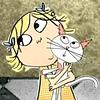You need to sign in or sign up before continuing.
Take a photo of a barcode or cover
Graphic: Eating disorder
Moderate: Domestic abuse, Infidelity, Sexual assault, Forced institutionalization, Medical content, Schizophrenia/Psychosis
Moderate: Self harm, Sexual assault, Schizophrenia/Psychosis
Graphic: Eating disorder, Rape, Self harm, Sexual assault, Suicide attempt
Graphic: Body horror, Emotional abuse, Physical abuse, Sexual assault, Suicidal thoughts, Forced institutionalization, Blood, Medical content, Suicide attempt, Sexual harassment
1. the way that people can percieve a single person is based entirely on their experiences both with said person and without
2. the role of a woman and the views men have of them in societies so dominated by patriarchy and conform are ones that are profoundly oppressive as much as they are structural
3. i wasn't ready for this book.
largely, my rating comes from the third point - i wasn't ready for this book. yes, it was written in a way that was very curt and confronting until you get to the third chapter. yes it was really interesting to see the different perspectives of yeong-hye from other people and purposefully not from yeong-hye herself, but i went into it only knowing The White Book/Huin by Han Kang and i wasn't ready for what this book presented to me. perhaps one day i'll read it again, but knowing what i know of it, i need to be in a very solid mental place for it.
Graphic: Eating disorder, Mental illness, Rape
Moderate: Self harm, Sexual assault, Schizophrenia/Psychosis
Minor: Child abuse, Physical abuse, Sexual violence, Violence, Vomit
The book follows Yeong-hye, a very ordinary South Korean woman who decides she must stop eating meat following a series of disturbing dreams. This decision creates a domino effect that begins with rebellion, societal rejection, and ultimately, mental collapse.
Kang shares Yeong-hye's story from the perspectives of three people - her husband, her brother-in-law, and her sister. She never shares Yeong-hye's own thoughts on her situation which, in my opinion, makes her even more of an enigma. The ambiguity surrounding her only deepens as the book progresses. The more I read the book, the more I felt like Yeong-hye’s vegetarianism was less about food and more about rejecting the norms that she was always forced to accept. It is her act of defiance that leads to a chain reaction of horrors inflicted by those around her, as if society needed to punish her rebellion whilst absolving itself of responsibility for her suffering
At times, the book can be hard to read, especially when her husband and brother-in-law objectify Yeong-hye and subject her to cruelty. However, it is those tough parts of the book that force you to acknowledge the harsh reality of a society that dehumanizes anyone who dares to deviate from its rules. Through Yeong-hye’s story, Kang paints a damning portrait of a world where those who don’t conform are cast aside, stripped of dignity, and treated as less than human.
This book is a powerful allegory, open to different interpretations. I interpreted it as a piece on autonomy, the oppressive nature of societal expectations, and the cost of nonconformity. I’m also curious to read more reviews and see how others interpret the story.
Graphic: Rape, Self harm, Sexual assault, Sexual content, Suicide attempt
Graphic: Domestic abuse, Emotional abuse, Mental illness, Physical abuse, Rape, Sexual assault, Blood, Suicide attempt
Graphic: Child abuse, Emotional abuse, Mental illness, Physical abuse, Sexual assault, Sexual violence, Forced institutionalization, Medical content, Medical trauma, Suicide attempt
Kang took a pretty interesting direction with In-hye that I personally hadn’t seen much when I first read this book in 2022. Often, the “perfect older sister” trope falls into the chracter admonishing her siblings and parents for forcing her into the role while she remains dependent on societal norms, and while In-hye does hold resentment she also holds an understanding of her sister and the life that <i>she</i> was forced to live. They are a lot more similar than realized throughout the first two parts. In-hye recounting her own dreams that have begun plaguing her and how she finds more comfort in the mental wards than she does outside bring her closer to her sister in what is presumably her final moments. I greatly appreciate that her reliance on her son is not framed as motherhood bringing her happiness, but instead that the familiarity of parenting (which she was conditioned into from a young age) brings her comfort when everything around her has become uncertain.
Graphic: Animal cruelty, Physical abuse, Sexual assault, Blood
Moderate: Animal death, Rape, Suicidal thoughts, Suicide attempt, Schizophrenia/Psychosis
Minor: Forced institutionalization, Vomit
Moderate: Animal cruelty, Eating disorder, Mental illness, Rape, Self harm, Sexual assault, Sexual violence, Medical content, Medical trauma, Suicide attempt, Schizophrenia/Psychosis






